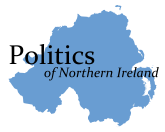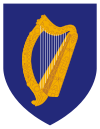- North/South Ministerial Council
-
Northern Ireland 
This article is part of the series:
Politics and government of
Northern IrelandNorthern Irish Law
Ireland 
This article is part of the series:
Politics and government of
the Republic of IrelandConstitutionJudiciaryDivisionsForeign policy
The North/South Ministerial Council (NSMC) (Irish: An Chomhairle Aireachta Thuaidh-Theas, Ulster Scots: Tha Noarth-Sooth Cooncil o Männystèrs / The North-South Council o Meinisters[1] / The North-South Meenisterial Council[2] / The North-South Council o Ministers[3]) is a body established under the Belfast Agreement (also known as the Good Friday Agreement) to co-ordinate activity and exercise certain governmental powers across the whole island of Ireland. The Council takes the form of meetings between ministers from both the Republic of Ireland and Northern Ireland and is responsible for twelve policy areas. Six of these areas are the responsibility of corresponding North/South Implementation Bodies. The body is based in the city of Armagh.
Contents
Policy areas
The Council is responsible for policy in twelve "Areas for Co-operation". These are:
- Agriculture: Common Agricultural Policy issues, animal and plant health, agricultural research and rural development.
- Education: Education for children with special needs, educational under-achievement, teacher qualifications and school, youth and teacher exchanges.
- Environment: Environmental protection, pollution, water-quality management and waste management.
- Health: Accident and emergency planning, co-operation on high-technology equipment, cancer research and health promotion.
- Tourism: The promotion of the island of Ireland as a tourist destination for overseas visitors via the establishment of a new company, known as Tourism Ireland.
- Transport: Co-operation on strategic transport planning including road and rail infrastructure and public transport services and road and rail safety.
Common policies in these areas are agreed at sectorial meetings of the North/South Ministerial Council, but implemented separately in each jurisdiction. In addition to these, six further "implementation bodies" span across the border. Policies in these areas are agreed at North/South Ministerial Council level and administered directly by cross-border bodies.
Implementation body Competence Waterways Ireland Management of specific and chiefly recreational inland waterways. Food Safety Promotion Board Food safety awareness. Special European Union Programmes Body Management and oversight of EU programmes and common chapters of the National Development Plan (Republic of Ireland) and the Northern Ireland Structural Funds Plan. InterTradeIreland Trade and business development. The North/South Language Body:
- Foras na Gaeilge
- Tha Boord o Ulstèr-Scotch
Promotion of the Irish and Ulster Scots languages. Foyle, Carlingford and Irish Lights Commission: - The Loughs Agency
- Lights Agency
The management and development of Lough Foyle and Carlingford Lough, the two sea lochs that mark the beginning and end of the Republic of Ireland and Northern Ireland border, and coastal lights. Originally, a new jointly owned agency, Lights Agency, was intended to replace the Republic-owned Commissioners of Irish Lights, which manages coastal lights throughout the island of Ireland. However, complexities arising from the transfer of functions have meant that this has had to be reconsidered. In addition to these bodies, tourism, while not within the competence of an implementation body, is promoted by an agency with responsibility for the whole island of Ireland called Tourism Ireland.
Organisation
The Ministerial Council consists of representatives of both the Northern Ireland Executive and the Government of the Republic of Ireland. The Ministerial Council may meet in either a plenary or sectoral format. In a plenary meeting a Northern Ireland delegation is led by the First Minister and Deputy First Minister of Northern Ireland while the Republic's delegation is led by the Taoiseach and Tánaiste (the Republic's prime minister and deputy prime minister).
A meeting in a sectoral format deals only with one particular policy area, and consists of the minister from the Republic with responsibility for the area under discussion, and two ministers from Northern Ireland (usually one Unionist and one Nationalist), including the minister with the relevant competence. The Council is supported by a standing Joint Secretariat, consisting of members of the civil services of both Northern Ireland and the Republic.
See also
- History of Northern Ireland
- Politics of the Republic of Ireland
- Belfast Agreement
- British-Irish Council
- British-Irish Intergovernmental Conference
External links
- North/South Ministerial Council official website
References
British Isles Terminology (Britain · Éire) · Naming dispute Politics Political cooperationBritish–Irish Council · British–Irish Parliamentary Assembly · Common Travel Area · North/South Ministerial Council · British-Irish Intergovernmental ConferenceGeography Island groupsChannel Islands · Islands of the Clyde · Great Britain · Hebrides (Inner · Outer) · Ireland · Isle of Man · Isles of Scilly · Northern Isles (Orkney · Shetland)Lists of islands ofHistory Current states and
dependenciesIreland · United Kingdom (England · Northern Ireland · Scotland · Wales)
Guernsey · Jersey · Isle of ManFormer statesSociety Modern languagesPeopleCategories:- Government of Northern Ireland
- Politics of the Republic of Ireland
- Ireland–United Kingdom relations
- Northern Ireland peace process
Wikimedia Foundation. 2010.
